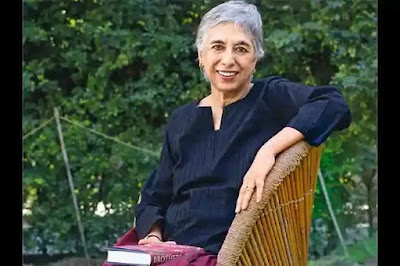Also Read
The other, noted novelist under the study is Manju Kapur: a professor of English at Miranda House in Delhi. Her first Novel 'Difficult Daughters' received the Common Wealth Award for the Eurasian region. Her novel 'A married woman' is a seductive story of a love at a time of political and religious upheaval, and is told with sympathy and intelligence 'A Married woman' is the story of an artist whose can vas challenges the constraints of middle class existence. Manju Kapur describes through her protagonist (Astha), "A woman should be aware of self-controlled, strong willed, self-reliant and rational, having faith in the inner strength of womanhood. A meaningful change can be brought only from within by being free in the deeper psychic sense." Astha like to have a break from dependence on others and proceeds on the path of full human status that poses a threat to Hemant and his male superiority.
 |
| Manju Kapur |
However, she finds herself trapped between the pressures of the modern developing society and shackles of the ancient biases. She sets out on her quest for a more meaningful life in her lesbian relationship. She canonizes and commemorates her insulted feminine sensibility raising the male tantrum to social transformation in the society. Manju Kapur in 'Difficult Daughters' presents the image of suffering women. In post-colonial era, partition has ever been the most prolific and prominent area for 6 creative writers.
During this phase, number of novels was written on the theme of the destruction. It brings the plight and provides a sad telling commentary on the breakdown on human values. In her writings, Manju Kapur has emphasised on the issues in the context of patriarchy; inter-religious marriage; family bond, male-female bond, co-existence of past and present. She has narrated her women protagonists as a victim of biology, gender, domestic violence, and circumstances. Kapur thinks that, "There is a man within every woman and a woman in every man. When, manhood is questioned womanhood is fragmented."
A major pre-occupation in recent Indian women's writings has been a delineation of Inner life and subtle relationships. In a culture where, individualism and protest have often remained alien ideas and marital bliss and the women's role at home is the central focus. It is interesting to see the emergence of not just an essential Indian sensibility but an expression of cultural diversion.